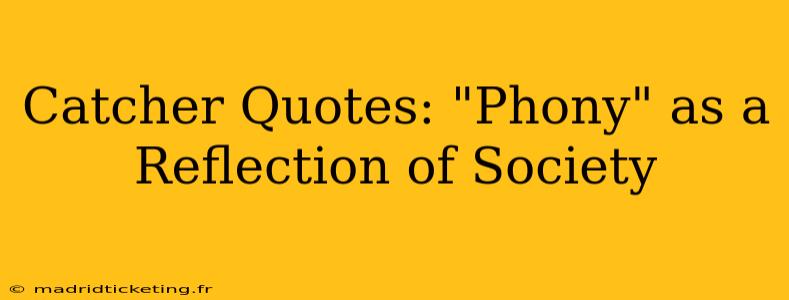J.D. Salinger's The Catcher in the Rye isn't just a coming-of-age story; it's a poignant commentary on societal hypocrisy and the alienation of youth. Holden Caulfield's repeated use of the word "phony" isn't simply teenage angst; it's a sharp critique of the adult world he perceives as superficial and insincere. This essay will explore how Holden's use of "phony" reflects Salinger's broader commentary on societal structures and the struggles of authenticity in a world obsessed with appearances.
What Does "Phony" Mean in the Context of The Catcher in the Rye?
Before delving into Holden's criticisms, we need to understand his definition of "phony." For Holden, "phony" isn't just about dishonesty; it encompasses a deeper sense of inauthenticity, superficiality, and a lack of genuine connection. It's about people who prioritize appearances over substance, who conform to societal expectations without genuine conviction, and who lack empathy and understanding. He sees "phoniness" in the adults around him – their pretentiousness, their hypocrisy, and their inability to connect on a meaningful level.
Why Does Holden Call So Many People "Phony"?
Holden's frequent use of "phony" stems from his deep disillusionment with the adult world. He witnesses adults engaging in behaviors he considers morally reprehensible, such as exploiting others for personal gain or prioritizing social status over genuine relationships. This disillusionment leads him to label many of the adults in his life as "phony," highlighting his perception of their lack of authenticity and their disconnect from genuine human connection.
Who are the "Phonys" in Holden's Life?
Holden's accusations aren't random. He directs his criticisms toward specific characters who embody the traits he finds so repulsive. His teachers, for instance, often come across as pompous and uncaring. His classmates are seen as shallow and preoccupied with social climbing. Even his own family members, at times, seem to fall short of his idealized vision of genuine relationships. This targeted use of "phony" underlines the pervasiveness of inauthenticity Holden perceives in society.
Is Holden Himself a "Phony"?
This is a crucial question. While Holden vehemently criticizes "phoniness," readers are left to consider whether his own actions and judgments are free from hypocrisy. His cynicism and judgmental nature, his own struggles with authenticity, and his tendency towards self-deception raise questions about his own level of "phoniness." This internal conflict adds another layer to Salinger's exploration of the complexities of human nature and the challenge of maintaining authenticity in a world that often pressures conformity.
What are the different types of "phoniness" Holden identifies?
Holden distinguishes various types of "phoniness." Some are overtly materialistic and status-obsessed. Others are characterized by intellectual posturing or moral hypocrisy. Still others are simply emotionally unavailable or incapable of genuine connection. This nuanced portrayal of "phoniness" prevents a simple black-and-white interpretation.
How Does Holden's Use of "Phony" Reflect Society?
Holden's repeated use of "phony" serves as a powerful critique of societal values. He challenges the emphasis placed on superficial appearances, material possessions, and social status. His condemnation of "phoniness" highlights the dangers of conformity and the importance of individual authenticity. It's a call for genuine connection, empathy, and a rejection of a system that prioritizes artifice over substance. This remains a relevant critique, even today, as societies continue to grapple with the pressures of conformity and the pursuit of superficial success.
Conclusion: The Enduring Relevance of "Phony"
Holden Caulfield's constant use of the word "phony" transcends the context of his adolescent angst. It serves as a powerful and enduring critique of societal structures that prioritize appearance over authenticity. Salinger's masterful use of this single word allows for a nuanced exploration of human nature, the struggle for authenticity, and the persistent tension between individual expression and societal expectations. The question of what constitutes "phoniness" remains a compelling and relevant one for readers across generations.

